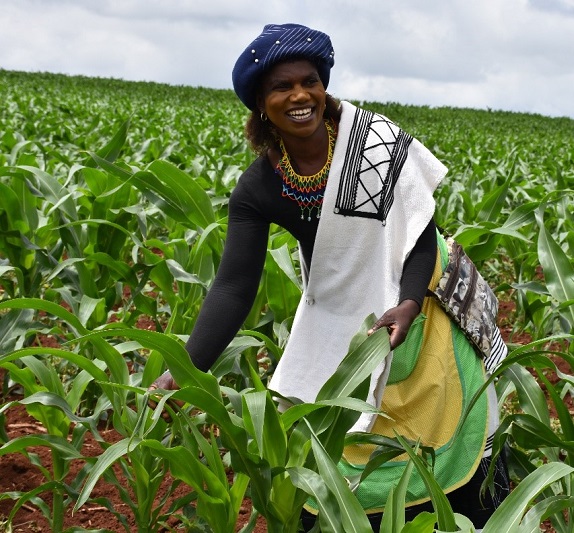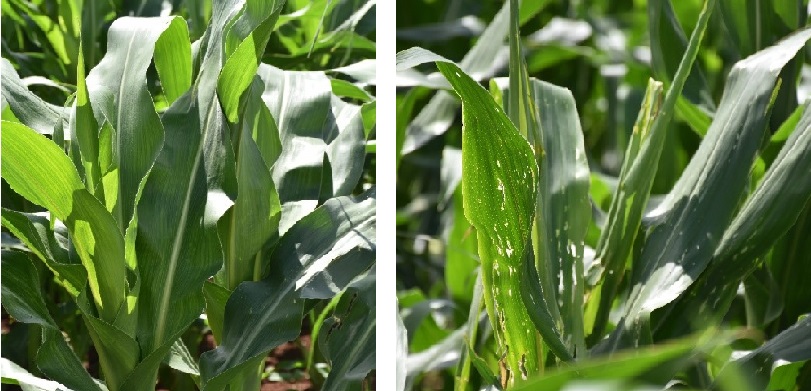
Eastern Cape, SOUTH AFRICA (CIMMYT) – Smallholder farmers in South Africa can now access and grow new maize varieties with transgenic resistance to stem borers, the most damaging insect pest of maize.
Partners in Water Efficient Maize for Africa (WEMA) – a public-private crop breeding initiative that helps farmers manage the risk of drought and stem borers infestation in Africa –developed the genetically modified maize seed branded as “TELA,” which has been released and licensed royalty-free to South Africa seed companies for sale to farmers at affordable prices.
TELA – derived from a Latin word Tutela meaning “protection” – contains a gene from Bacillus thurigiensis (Bt) that helps the maize to resist damage from major stem borers to give farmers better yields. Five seed companies – Capstone, Jermat, Monsanto, SeedCo and Klein Karoo – are marketing the seed to smallholders.
The WEMA project is helping smallholder farmers face two of their chief menaces through the new insect protected and drought tolerant maize hybrids. Led by the African Agricultural Technology Foundation (AATF), WEMA brings together public and private partners including the International Maize and Wheat Improvement Center (CIMMYT), Monsanto and the national agricultural research organizations of Kenya, Mozambique, South Africa, Tanzania and Uganda.
Stem borers affect maize production on about 30 million hectares in developing countries, feeding aggressively on leaves, stems and ears and significantly reducing grain yield.
In eastern and southern Africa, two stem borers – Busseola fusca and Chilo partellus – are the most damaging pests. In South Africa, reported annual yield losses in maize range between 10 and 75 percent. Yield losses in maize and sorghum as a result of Chilo partellus have exceeded 50 percent.
During the last 2016 planting season, Nontoko Mgudlwa was one among the selected smallholders to host a trial for TELA maize hybrid.
“I received a small packet of TELA from our extension officer, and planted it in this small portion of land on December 9, 2016,” said Mgudlwa. “The land was not enough to add my indigenous maize, but I’m very happy to see how the crop is performing despite the very visible attack on the border crop by stem borers,” continued Mgudlwa, pointing out the severely damaged border crops that were planted with refuge seed as a control group alongside TELA.

The farmers who hosted trials were given a 2 kilogram packet of TELA maize as part of demonstrations to raise awareness about the variety and help farmers see its performance. The packet also contained a small pack of seed of non-Bt maize called “refuge” seed to sow at the border of the main plot. This non-Bt maize allows the survival of susceptible borers and thus delays the emergence or spread in borer populations of individuals able to overcome the Bt maize resistance.
Mgudlwa’s home in Nqatu Great Palace suffers frequent borer infestations, which most farmers control using insecticides. As part of the trial, Mgudlwa did not use chemicals despite a heavy invasion of the pests on her farm and evidence of significant damage in the refuge crop.
“It is critically important for farmers to understand the requirement and procedure of planting TELA maize and the refuge seed found in a small bag inside the TELA seed pack,” said Kingston Mashagaidze, WEMA project coordinator in South Africa. “The extension officers have been trained on how to plant TELA and the refuge seed, so they can help farmers to plant the crop the right way.”
Recently, Mozambique joined Kenya, Tanzania and Uganda to successfully conduct confined field trials (CFT) for genetically modified maize. The CFTs are important to generate data on the performance of the Bt maize and commercial conventional hybrids infested by stem borers to support the application for the release of TELA hybrids in the remaining four WEMA countries.
 Capacity development
Capacity development 
